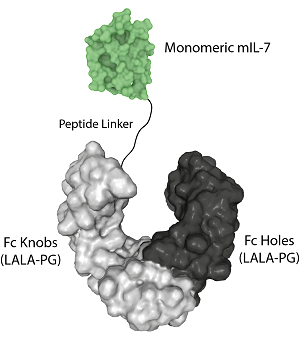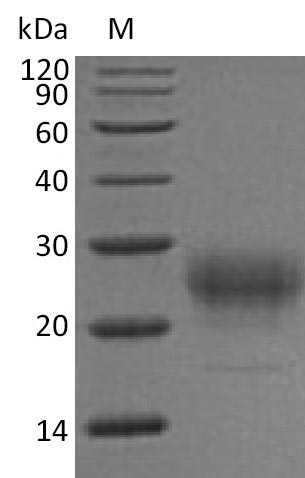
Protein structure of IL-7 (mouse) (monomeric):Fc (LALA-PG)-KIH (human) (rec.) (Prod. No. AG-40B-0256).
IL-7 (mouse) (monomer):Fc (silent) InVivoKine(tm)
AG-40B-0256
Protein IDP10168
Product group Proteins / Signaling Molecules
Overview
- SupplierAdipoGen Life Sciences
- Product NameIL-7 (mouse) (monomer):Fc (silent) InVivoKine(tm)
- Delivery Days Customer10
- CertificationResearch Use Only
- Concentration1 mg/ml
- Estimated Purity>95%
- Gene ID16196
- Target nameIl7
- Target descriptioninterleukin 7
- Target synonymsA630026I06Rik, Il-7, hlb368, interleukin-7
- Protein IDP10168
- Protein NameInterleukin-7
- Scientific DescriptionInterleukin-7 (IL-7) is a hematopoietic growth factor and a member of the IL-7/IL-9 family, which is produced by fetal liver cells, stromal cells in the bone marrow (BM), thymus and other epithelial cells, including keratinocytes and enterocytes. The receptor of IL-7, IL-7R, is a heterodimeric complex consisting of the alpha-chain (CD127) and the common cytokine receptor gamma-chain, shared with the receptors for IL-2, IL-4, IL-7, IL-9, IL-15 and IL-21, and expressed in a variety of cells. IL-7 has a critical developmental function at every stage of T cell development, for both alphabeta and gammadelta lineages, and for the development and survival of naive T cells as well as generation and maintenance of CD4 and CD8 memory. IL-7 is also essential for the development and maintenance of the new ILCs. IL-7 is important throughout hematopoiesis, facilitating key lineage fate decisions. IL-7 is thought to support aberrant immune activity in autoimmune diseases such as diabetes and multiple sclerosis and in chronic inflammatory diseases such as rheumatoid arthritis, ankylosing spondylitis and inflammatory bowel disease. IL-7 contributes to leukemia development in vivo and also stimulates multiple immune-mediated mechanisms that contribute to the eradication of tumors. The IL-7 (mouse) (monomer):Fc (silent) InVivoKine™ is produced by using two different vectors, one encoding for the IL-7 (mouse):Fc (LALA-PG) Knobs sequence (synthesizing a protein of 55kDa) and one encoding for the Fc (LALA-PG) Holes sequence (synthesizing a protein of 28kDa). Both vectors transfected into HEK293 cells produce both Fc molecules (Knobs-into-Holes technology; J.B. Ridgway, et al.; Protein Eng. 9, 617 (1996)) required for dimerization of the Fc moieties and for secretion of the final protein IL-7 (mouse) (monomer):Fc (silent) InVivoKine™. The LALA-PG mutations inhibit binding to FcgammaRs and C1q while FcRn binding and Fc stability remain unaffected. InVivoKines™ are a new generation of recombinant fusion proteins for immunotherapeutic, preclinical and translational in vivo research, developed and manufactured by AdipoGen Life Sciences. - InVivoKines™. Recombinant Protein. Mouse IL-7 (aa 26-154) is fused at the C-terminus to the Fc portion of human IgG1 (LALA-PG) (Knobs-into-Holes technology) (see reference: J.B. Ridgway, et al.; Protein Eng. 9, 617 (1996)). Source: HEK 293 cells. Produced using animal component-free medium.. Activates CD4+ T Cells proliferation. The Fc contains the mutations LALA-PG that abolish the interaction between the Fc and FcgammaRs and therefore Fc undesirable effects. Lyophilized. Contains PBS. Interleukin-7 (IL-7) is a hematopoietic growth factor and a member of the IL-7/IL-9 family, which is produced by fetal liver cells, stromal cells in the bone marrow (BM), thymus and other epithelial cells, including keratinocytes and enterocytes. The receptor of IL-7, IL-7R, is a heterodimeric complex consisting of the alpha-chain (CD127) and the common cytokine receptor gamma-chain, shared with the receptors for IL-2, IL-4, IL-7, IL-9, IL-15 and IL-21, and expressed in a variety of cells. IL-7 has a critical developmental function at every stage of T cell development, for both alphabeta and gammadelta lineages, and for the development and survival of naive T cells as well as generation and maintenance of CD4 and CD8 memory. IL-7 is also essential for the development and maintenance of the new ILCs. IL-7 is important throughout hematopoiesis, facilitating key lineage fate decisions. IL-7 is thought to support aberrant immune activity in autoimmune diseases such as diabetes and multiple sclerosis and in chronic inflammatory diseases such as rheumatoid arthritis, ankylosing spondylitis and inflammatory bowel disease. IL-7 contributes to leukemia development in vivo and also stimulates multiple immune-mediated mechanisms that contribute to the eradication of tumors. The protein IL-7 (mouse) (monomeric):Fc (LALA-PG)-KIH (human) (rec.) is produced by using two different vectors, one encoding for the IL-7 (mouse):Fc (LALA-PG) Knobs sequence (synthesizing a protein of 55kDa) and one encoding for the Fc (LALA-PG) Holes sequence (synthesizing a protein of 28kDa). Both vectors transfected into HEK293 cells produce both Fc molecules (Knobs-into-Holes technology; J.B. Ridgway, et al.; Protein Eng. 9, 617 (1996)) required for dimerization of the Fc moieties and for secretion of the final protein IL-7 (mouse) (monomeric):Fc-KIH (human) (rec.). The LALA-PG mutations inhibit binding to FcgammaRs and C1q while FcRn binding and Fc stability remain unaffected. InVivoKines™ are a new generation of recombinant fusion proteins for immunotherapeutic, preclinical and translational in vivo research, developed and manufactured by AdipoGen Life Sciences.
- Storage Instruction-20°C,2°C to 8°C
- UNSPSC41116120
- SpeciesMouse


